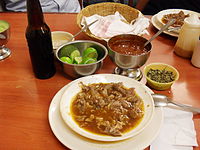
Photo from wikipedia
Abstract Two growth performance studies and two digestibility trials were conducted to evaluate the effects of feeding Enogen Feed Corn silage and corn grain to growing cattle. In Exp. 1,… Click to show full abstract
Abstract Two growth performance studies and two digestibility trials were conducted to evaluate the effects of feeding Enogen Feed Corn silage and corn grain to growing cattle. In Exp. 1, there were a total of four diets offered for ad libitum intake. The four diets consisted of two varieties of corn (Enogen Feed Corn [EFC] vs. yellow #2 corn [CON]) with two different methods of corn processing (dry-rolled [DR] vs. whole-shelled [WS]) and were formulated to provide 1.13 Mcal NEg/kg dry matter (DM); corn grain was 28.6% of diet DM. Average daily gain (ADG) and ending body weight tended to be greater for calves fed EFC than for those fed CON (P < 0.10). Gain:feed (G:F) was better for calves fed EFC (P < 0.01), improving by 5.5% over calves fed CON. In Exp. 2, a digestibility trial was conducted using seven cannulated Holstein steers fed the same diets from Exp. 1. Ruminal pH was not affected by corn variety (P > 0.82). Liquid passage rate was greater for CON-fed calves and associated with lower digestibility. Total tract DM and organic matter (OM) digestibilities were greater for EFC-fed calves (P < 0.04). In Exp. 3, there were four diets offered for ad libitum intake. Dietary factors were arranged as a 2 × 2 factorial and consisted of two hybrids of corn silage (EFC silage [EFC-S] vs. control silage [CON-S]) and two varieties of corn grain (EFC grain [EFC-G] vs. control [CON-G]; both were dry-rolled). Diets were formulated to provide 1.11 Mcal NEg/kg DM; corn grain was 38.5% of diet DM, and corn silage was 40% of diet DM. ADG was 6.0% greater (P < 0.01) and G:F was numerically (P < 0.14) 3.3% greater for calves fed EFC-S than for those fed CON-S, but substituting EFC-G for CON-G did not affect ADG or G:F. In Exp. 4, a digestibility trial was conducted using eight cannulated beef steers fed the same diets as Exp. 3. Liquid passage rate (P > 0.20), ruminal pH (P > 0.23), and ruminal total volatile fatty acid concentrations (P > 0.27) were unaffected by treatment. Total tract digestibilities of DM and OM were numerically greater by 2.5% and 2.2%, respectively, for calves fed the EFC-S compared with those fed CON-S. Feeding a corn hybrid containing alpha-amylase enzyme improved G:F of growing calves. Feeding EFC can benefit the beef industry by allowing less processing of grain without sacrificing performance.
Journal Title: Translational Animal Science
Year Published: 2022
Link to full text (if available)
Share on Social Media: Sign Up to like & get
recommendations!